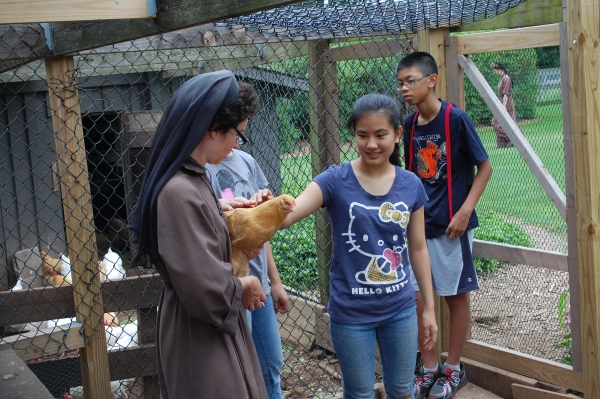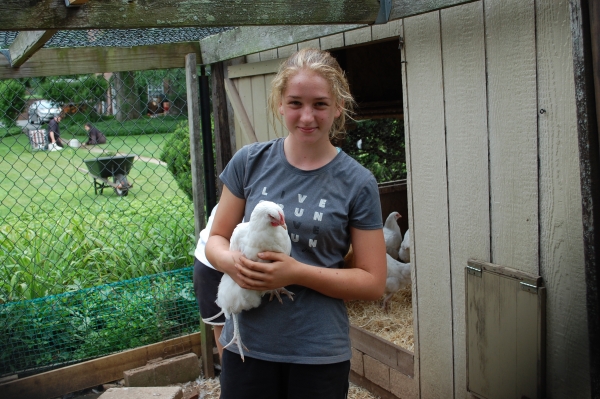
Pillar: Reverence
Laudato Si’ Action Plan Goals: Ecological Education

Pillar: Reverence
Laudato Si’ Action Plan Goals: Ecological Education
Group (Grade Levels): All ages
Learning Goals:
- Learn to care for chickens with reverence as living beings and as a food source, created and given to us by God.
- Experience the dynamic between humans (stewards of creation) and animals (creation) as a reflection of the providential and loving relationship between God, the Creator, and human beings, the created.
Materials needed: Chicken coop (with roosts, nesting boxes) with access to the outdoors and proper ventilation, feed (appropriate for age of the flock), ground oyster shells, feed trough and waterer, outdoor run (enclosed or electrically fenced), heat lamps, hay or wood shavings for flooring, cleaning agents for disinfecting the coop (i.e. bleach) and for washing the eggs (soap and water), hydrated lime powder, old newspaper, cloths and buckets for washing eggs, egg cartons.
Estimated Time to Complete Activity: 1-3 hours (depending on what needs to be done)
Estimated Number of Sessions if Activity Continues: Weekly or bi-weekly (the number of sessions is dependent on how long the chickens are kept)
Indicate any pre-planning needed: Gather and/or purchase tools and supplies as needed for the activities.
General Outline of Experience
Proclaim the Gospel passage and engage in discussion
Matthew 6: 25-34 (Dependence on God): “Therefore I tell you, do not worry about your life, what you will eat or drink; or about your body, what you will wear. Is not life more than food, and the body more than clothes? Look at the birds of the air; they do not sow or reap or store away in barns, and yet your heavenly Father feeds them. Are you not much more valuable than they? Can any one of you by worrying add a single hour to your life? And why do you worry about clothes? See how the flowers of the field grow. They do not labor or spin. Yet I tell you that not even Solomon in all his splendor was dressed like one of these. If that is how God clothes the grass of the field, which is here today and tomorrow is thrown into the fire, will he not much more clothe you—you of little faith? So do not worry, saying, ‘What shall we eat?’ or ‘What shall we drink?’ or ‘What shall we wear?’ For the pagans run after all these things, and your heavenly Father knows that you need them. But seek first his kingdom and his righteousness, and all these things will be given to you as well. Therefore do not worry about tomorrow, for tomorrow will worry about itself. Each day has enough trouble of its own.”
What does this passage tell us about our relationship with God?
Laudato Si’, n. 68 and suggested discussion questions
“This responsibility for God’s earth means that human beings, endowed with intelligence, must respect the laws of nature and the delicate equilibria existing between the creatures of this world, for ‘he commanded and they were created; and he established them for ever and ever; he fixed their bounds and he set a law which cannot pass away’ (Ps 148:5b-6). The laws found in the Bible dwell on relationships, not only among individuals but also with other living beings. ‘You shall not see your brother’s donkey or his ox fallen down by the way and withhold your help… If you chance to come upon a bird’s nest in any tree or on the ground, with young ones or eggs and the mother sitting upon the young or upon the eggs; you shall not take the mother with the young’ (Dt 22:4, 6). Along these same lines, rest on the seventh day is meant not only for human beings, but also so ‘that your ox and your donkey may have rest’ (Ex 23:12). Clearly, the Bible has no place for a tyrannical anthropocentrism unconcerned for other creatures.”
- What does Pope Francis say regarding the relationship between God and creation and between humans and creation?
- Lead up to key point: We care for chickens (creation) as God cares for us, with love and reverence for the gift that they are. The way we care for creation reflects how God cares for and reverences us.
Close the time of gathering with a prayer.
Concrete opening experience:
- Discuss appropriate behavior when working with the chickens (i.e. not chasing them or grabbing their feathers, being calm around them, etc.).
- Have the participants spend some time with the chickens so that they begin/learn to feel comfortable being around them (i.e., feeding them weeds and/or food scraps, holding or petting them, etc.).
Orientation to tools/elemental techniques:
- Orient the participants to the chicken coop, explaining the areas/parts of the coop and their functions (i.e., nest boxes, roosts, outdoor run/enclosure, etc.).
- Show and explain the equipment and tools used (i.e., feed trough, waterer, heat lamps, pitchfork, shovel, electric fence, etc.).

Options for activities with the chickens.
NOTE: It is best if the participants can work in groups while doing the activities.
- Feeding the chickens and washing and filling the waterer
- Collecting and washing eggs
Suggestion: Pray the rosary while washing eggs, depending upon the number of eggs needing to be washed. Each egg can represent a bead on the rosary, and the participants can say each prayer while washing an egg. (This will also help ensure that the eggs are properly washed.)
Suggestion: Offer an intention while washing each egg. - Cleaning out the chicken coop and nest boxes
If the group is large and the coop is large enough, divide the participants into smaller groups, having each group focus on cleaning a particular area of the coop. - Moving the coop and electric fence (if applicable)
- Working in the chicken yard (if applicable)

Enjoyment of the fruits of the activity
- Set up simple stools in the chicken yard and meet there for the time of discussion and integration.
- Eat some fresh eggs together! (if time permits)
- Or alternatively, give some eggs to the participants to take home and share with their families.

Integration of the experience
Discussion questions:
What did you like most about this experience?
What did you like least?
What did you observe about the chickens and their behaviors, their ways of relating to each other and to humans, and their particular adaptations to life?
Do you like being with the chickens? Why or why not?
Did caring for the chickens make you think about how God cares for you? If so, how? If not, why not?
Potential analogies:
How the chickens depend on us for their care can be analogous to the way we depend on God for our care.
Just as the chickens depend upon us to feed and water them and to care for them, and they cannot live without our human care, so we are dependent upon God.
- God provides for our material needs by giving us creation for sustenance and for enjoyment.
- Creation is a gift to us on many levels, not just for our material needs but also for our emotional and spiritual needs. Just as the animals depend upon us, we are dependent on God and trust in His love and providence.

“A Christian Prayer in Union with Creation,” Laudato Si’, n. 246:
Father, we praise you with all your creatures.
They came forth from your all-powerful hand;
they are yours, filled with your presence and your tender love. Praise be to you!
Son of God, Jesus,
through you all things were made.
You were formed in the womb of Mary our Mother, you became part of this earth,
and you gazed upon this world with human eyes. Today you are alive in every creature
in your risen glory.
Praise be to you!
Holy Spirit, by your light
you guide this world towards the Father’s love and accompany creation as it groans in travail. You also dwell in our hearts
and you inspire us to do what is good. Praise be to you!
Triune Lord, wondrous community of infinite love, teach us to contemplate you
in the beauty of the universe,
for all things speak of you.
Awaken our praise and thankfulness
for every being that you have made.
Give us the grace to feel profoundly joined
to everything that is.
God of love, show us our place in this world
as channels of your love
for all the creatures of this earth,
for not one of them is forgotten in your sight. Enlighten those who possess power and money
that they may avoid the sin of indifference,
that they may love the common good, advance the weak, and care for this world in which we live.
The poor and the earth are crying out.
O Lord, seize us with your power and light,
help us to protect all life,
to prepare for a better future,
for the coming of your Kingdom
of justice, peace, love and beauty.
Praise be to you!
Amen.




